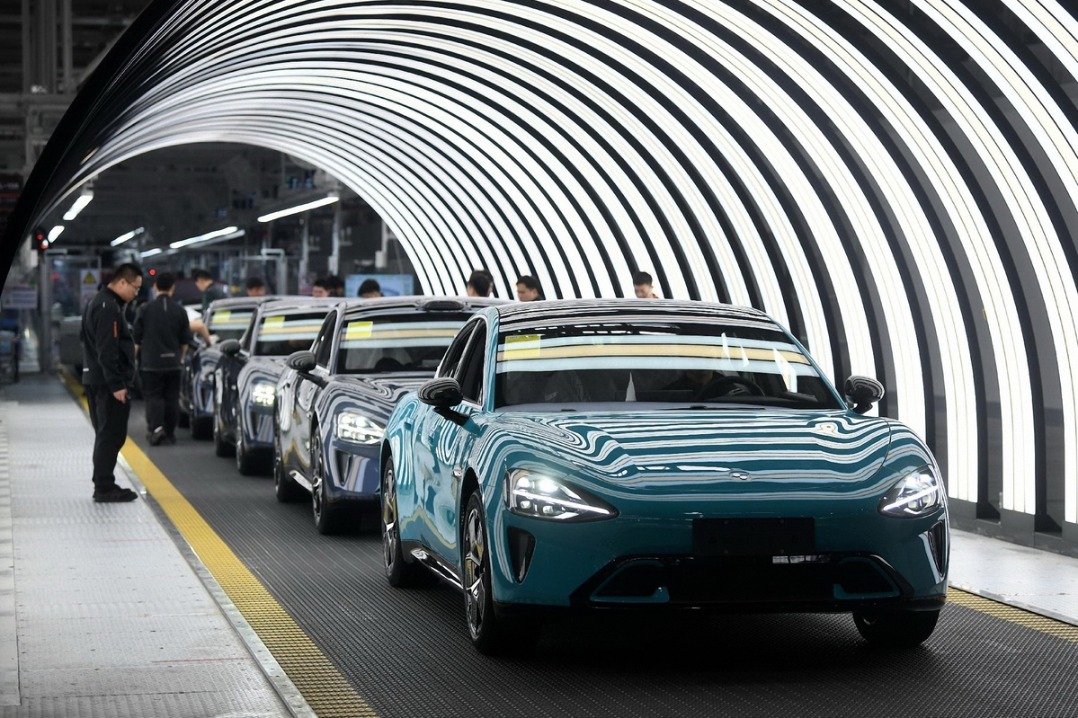Wheels stop turning in cycle-making hub
By Zhang Yangfei in Tianjin | China Daily | Updated: 2019-08-21 09:38

According to a survey of shared-bike users nationwide, the total use of private cars, car-hailing services and taxis fell by 55 percent by the end of 2017, effectively reducing road congestion.
That was when Wangqingtuo was at its height.
"Wangqingtuo has been famous for producing bicycles and e-bikes at low cost since the very early years," said a 35-year-old woman surnamed Dong, who has run an e-bike shop in Wangqingtuo for seven years.
"It was busiest here in 2016 and 2017. Both sides of the street were occupied by either big or small bike manufacturers," she added.
A member of staff, surnamed Huang, at the Wangqingtuo assembly factory of the Shanghai Phoenix Bicycle Company, said they had taken orders for only a few hundred bikes in recent years. "There were too many orders from the shared-bike companies for our small factory to handle," she said.
Eyeing the opportunities, more bike-sharing startups entered the market and scrambled for a share by putting more bikes on the roads and charging users only a small amount for an hour's ride. Many did not ask for deposits for rides.
As orders kept flooding in, many manufacturers saw it as their best opportunity to make a profit. Some abandoned their original business and turned solely to shared bikes, putting the money they made into increasing inventory to prepare for the "insatiable demand" they expected, Huang said.
Then came the collapse. The cutthroat competition began to eliminate players with poorer finances. In June 2017, Wukong Bicycle closed when its funding sources dried up, followed by Nanjing Dingding Bicycle in July that year.
In August 2017, Xiaoming Bicycle was unable to refund all deposits to users, and the following month Kuqi Bicycle announced that it would be acquired by a company in Sichuan province, but did not disclose further information.
In November 2017, Bluegogo, China's third-largest bike sharer, went bankrupt. Its founder Li Gang said in an open letter that its bikes and services were "feeble" in the absence of capital support and promised to raise funds.
Moreover, the random "parking" of a large number of bikes clogged the roads in cities, and the companies' failure to operate proper maintenance and management exacerbated the challenge to public governance.
Since mid-2017, many cities, such as Shanghai, Hangzhou in Zhejiang province, Fuzhou in Fujian province, and Guangzhou in Guangdong province, have issued successively stricter restrictions on additional shared bikes. Moreover, stricter environmental policies related to manufacturing also imposed a heavier cost on many factories in Wangqingtuo, the majority of which are small, family-run businesses.
Dong, who runs the e-bike shop, said: "Since last year, many factories have shut down. Retailers also disappeared."
The owner of the Shengyou Bicycle Factory, who requested anonymity, said: "Shared bikes? We hate them. No manufacturer in town has accepted orders for them since last year. We were severely battered by such business. Those companies just vanished without even asking for the bikes, hence those abandoned on the farmland."
Tianjin is an important bike-making hub, home to nearly half China's entire output. Wangqingtuo, benefiting from the city's rich resources, earned its reputation for its small workshop-style operations and low production costs.
The town started in the cycle business in 1994, when some workers with experience of assembling bikes set up small workshops. The profits soon attracted competitors, who moved in and established "China's first bike town".
The 1990s were a time when a bicycle was needed in each household for commuting to work.
























